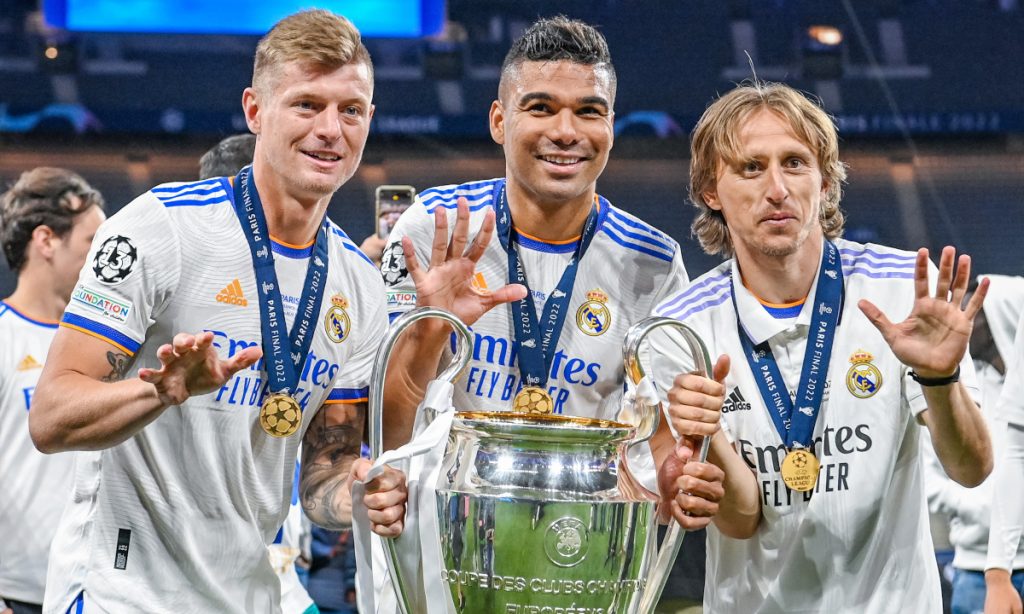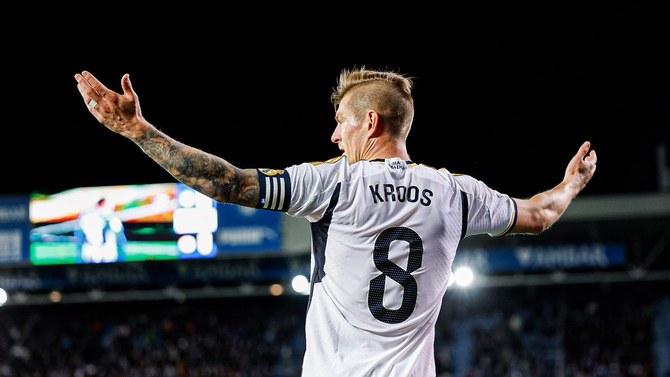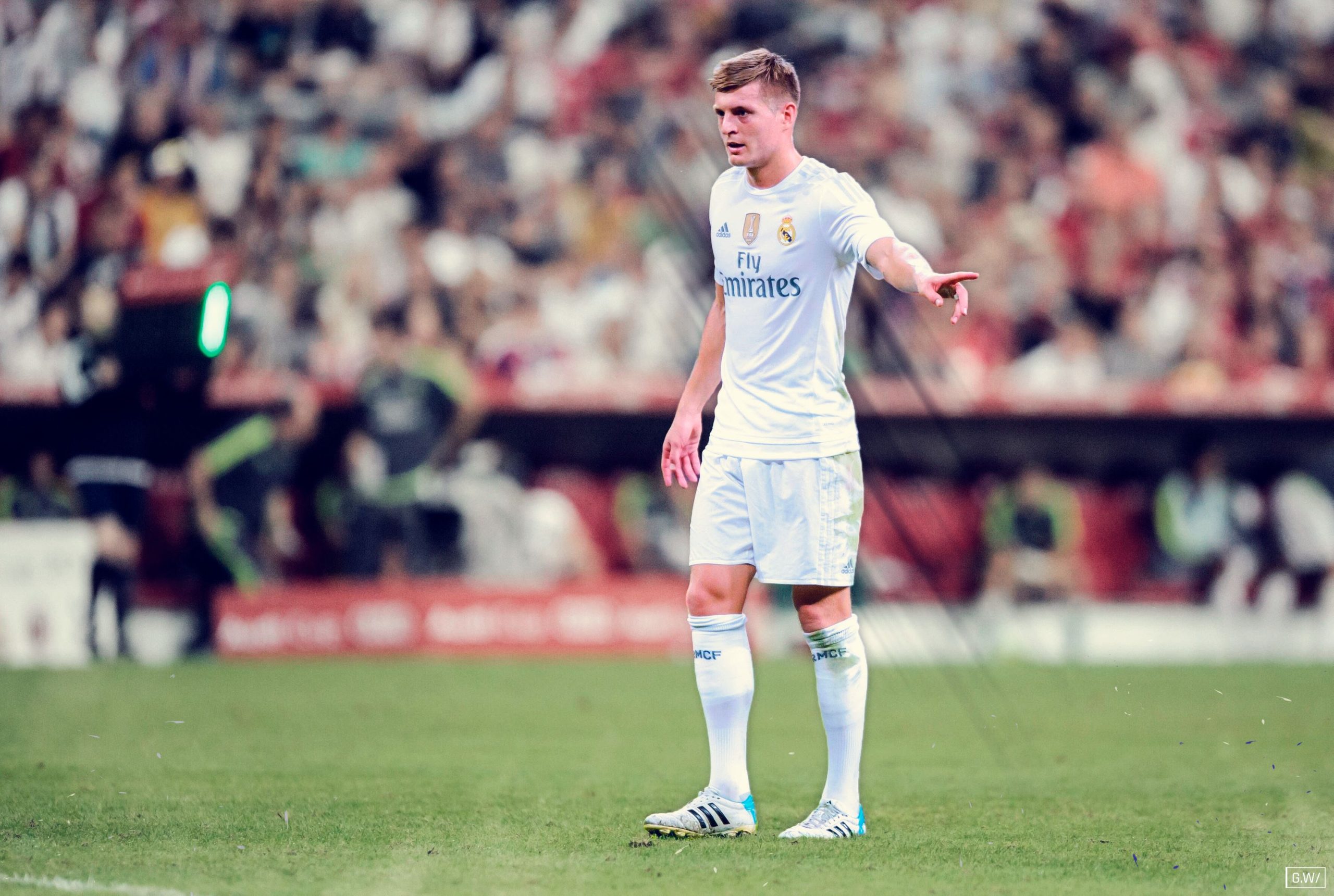The camera sweeps over a pristine football pitch, bathed in the golden hues of a setting sun. In the distance, the silhouettes of fans slowly disperse, their chants and cheers still echoing in the air. This is the stage where legends are born and stories are etched into the annals of history. At the center of this vast canvas stands one man poised—Toni Kroos.
In today’s football, physical prowess often takes center stage. Pace and power have become the new trends as the game has evolved from technicians to athletes. Yet, Toni Kroos’ success is a testament to the power of tactical intelligence and mental acuity. Kroos is not the fastest player on the field, but his understanding of the game is unparalleled. His ability to read the flow of play, anticipate opponents’ moves, and position himself effectively has made him the puppeteer controlling the pace and rhythm of the game.
Kroos’ vision allows him to execute passes that others wouldn’t even conceive, splitting defenses with surgical precision. His calmness under pressure is the “art of nonchalance” in its purest form, reminiscent of a Scorsese protagonist navigating chaos with unshakable resolve. When Kroos has the ball, he slows the game to his tempo, dictating terms and orchestrating attacks—a trait possessed only by the elite. This mental sharpness, this knack for being two steps ahead, sets him apart. He plays football like a game of chess, always thinking several moves ahead.
No discussion of Toni Kroos’ legacy is complete without mentioning the legendary midfield trio he formed with Luka Modric and Casemiro at Real Madrid. Together, they were the heartbeat of a team that dominated European football. Each brought a unique quality to the partnership: Modric’s dribbling and vision, Casemiro’s defensive solidity, and Kroos’ passing and composure.

The synergy between them was like a finely-tuned orchestra. Kroos was the conductor, Modric the virtuoso soloist, and Casemiro the sturdy backbone. Their understanding was almost telepathic, their movements synchronized in a way that made dismantling even the toughest defenses look effortless. Under their stewardship, Real Madrid won multiple Champions League titles and league titles, demonstrating that the whole was indeed greater than the sum of its parts.
Kroos’ role in this triumvirate was pivotal. His ability to distribute the ball accurately and efficiently allowed Modric to explore his creative instincts while providing Casemiro the freedom to focus on breaking up opposition plays. Kroos’ presence ensured balance and cohesion, turning the midfield into an unbreachable fortress and a launching pad for attacks.
The hallmark of Toni Kroos’ game is his passing precision. His ability to deliver pinpoint passes over any distance is nothing short of extraordinary. Whether it’s a short, incisive pass to unlock a defense or a long, raking ball to switch play, Kroos executes with a level of accuracy that borders on the supernatural. His passing range is vast, and his technique flawless.
In high-stakes moments, when the pressure is immense, Kroos’ composure and technical skill shine the brightest. He has the rare ability to slow down the game in his mind, making the right decisions with an almost eerie calm. This attribute is especially valuable in tight matches where one precise pass can make all the difference. Like a Scorsese film, where every frame is meticulously crafted, every pass from Kroos feels deliberate and essential.
One of the most iconic examples of his passing prowess came in the 2018 World Cup, where his last-minute free-kick against Sweden exemplified his clutch performance under pressure. With Germany’s tournament hanging in the balance, Kroos delivered a masterclass in composure and precision, curling the ball into the net and securing a vital victory.
As Toni Kroos transitions towards the end of his playing career, his influence extends beyond his on-field performances. Over the years, Kroos has evolved into a mentor and leader, guiding younger players with his experience and wisdom. His leadership style is not about grand gestures or fiery speeches but about consistency, professionalism, and leading by example.
Kroos’ approach to the game, his dedication to maintaining peak physical and mental condition, and his unwavering focus are lessons that young players at Real Madrid and the German national team have absorbed. He exemplifies the kind of quiet confidence and work ethic that aspiring footballers can look up to. His ability to remain calm under pressure and make crucial decisions has been a source of inspiration for many.
The importance of a strong pipeline and succession plan extends beyond sports into many fields, including business, arts, and science. Just as in football, where seasoned players mentor emerging talents, successful organizations and institutions recognize the value of nurturing future leaders. This process ensures continuity, fosters innovation, and maintains a high standard of excellence.
In scientific research, mentorship is vital for advancing knowledge and innovation. Established researchers train young scientists, sharing their expertise and fostering a collaborative environment that pushes the boundaries of discovery. This transfer of knowledge ensures that progress continues and that each generation builds upon the achievements of those who came before.
In the football world, the mentor’s role is crucial, shaping the next generation and ensuring the legacy continues. Kroos’ mentorship guarantees that his influence will be felt long after he retires. Players like Federico Valverde, Aurélien Tchouaméni, and Eduardo Camavinga have greatly benefited from Kroos’ guidance, inheriting not only technical skills but also the mentality needed to excel at the highest level. Through his leadership, Kroos has instilled a deep understanding of the game, teaching these young talents how to read the field, maintain composure under pressure, and make intelligent decisions. His impact is seen in their growth as they adopt his disciplined approach and tactical awareness, ensuring that his legacy will endure through their success.
Ultimately, the legacy of a mentor, whether in football or any other field, is measured by the success and contributions of those they have guided. By investing in the development of future talents, mentors like Kroos not only secure their own legacy but also ensure the sustained growth and evolution of their respective fields.
Toni Kroos’ legacy is not just defined by statistics or the number of trophies he has won, though these are impressive in their own right. It is his style, his intelligence, and his impact on the game that will be remembered. Kroos represents a different archetype of a footballer, one who excels through intellect and technique rather than sheer physicality.
His career, much like a Scorsese film, is layered and complex, offering something new upon each reflection. Kroos’ ability to control a game, his impeccable passing, and his strategic understanding of football will be studied and admired for years to come. He has shown that there is a place in the modern game for the thinking footballer, one who can dictate play through vision and intelligence.
The Final Whistle
The parallels with legends from other sports further highlight Kroos’ impact. Bjorn Borg, regarded as one of the greatest tennis players of all time, left an indelible mark with his dominance and unique style of play. His stoic demeanor and exceptional skill propelled him to win 11 Grand Slam titles, including five consecutive Wimbledon championships and six French Open titles. Borg’s ability to control matches with his powerful groundstrokes and impeccable technique made him a formidable force on any surface.
Similarly, AB de Villiers, known as ‘Mr. 360′ in the cricketing world, redefined the boundaries of what was possible on a cricket field. His innovative shot-making, extraordinary athleticism, and ability to play unconventional strokes from any position made him a nightmare for bowlers around the globe. De Villiers’ versatility and adaptability across all formats of the game earned him the admiration of fans and fellow cricketers alike. He holds numerous records and is considered one of the most dynamic and entertaining batsmen to have ever played the game.
Just as Borg and de Villiers left behind legacies that continue to inspire future generations of tennis players and cricketers, Kroos’ departure from the game leaves a void that will be felt for years to come. Their decisions to retire at the peak of their careers, while they were still performing at the highest level, speak volumes about their dedication to their craft and their understanding of their own legacy. As the saying goes, “Die and be a hero, or live long enough to see yourself become the villain.” In a world where many athletes prolong their careers past their prime, Borg, de Villiers, and now Kroos have chosen to bow out gracefully, ensuring that their contributions to their respective sports are remembered with reverence and admiration.

As we bid farewell to Toni Kroos, we do so not only with gratitude for his exceptional talent and achievements but also with an acknowledgment of the lasting impact he, like Borg and de Villiers, has had on the world of sports. Their departures mark the end of an era, but their legacies will linger, whispering to us the enduring power of athletic brilliance and the timeless essence of true sportsmanship.



Leave a Reply